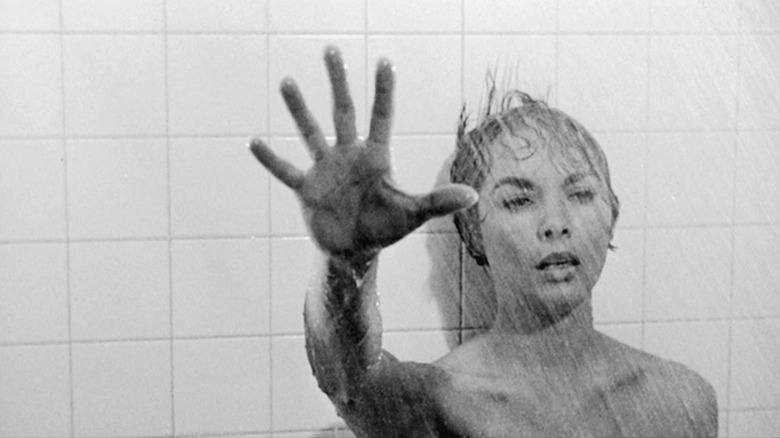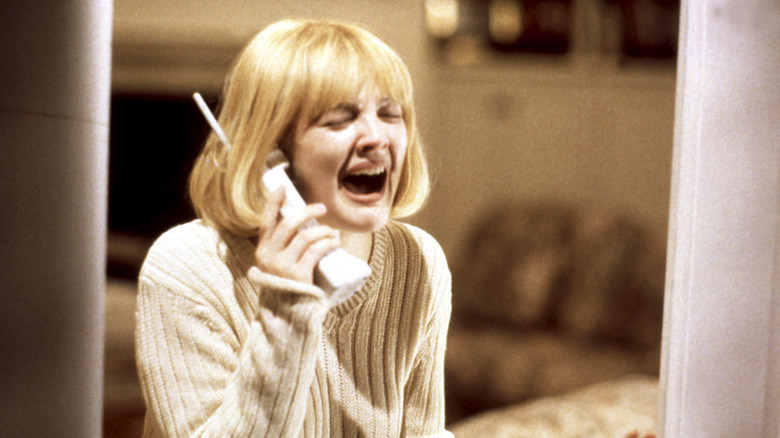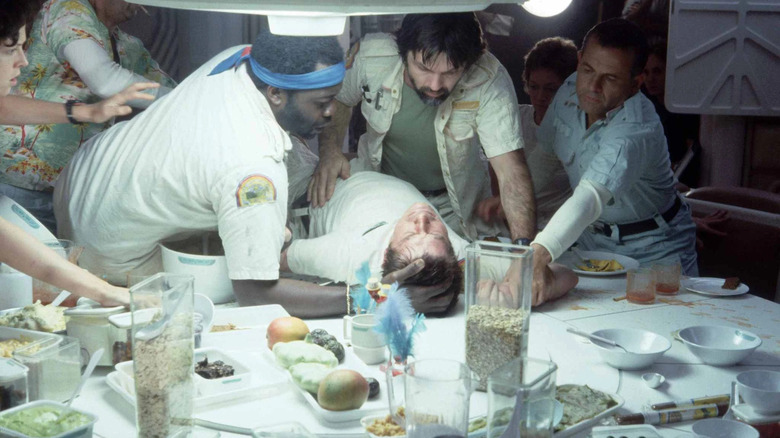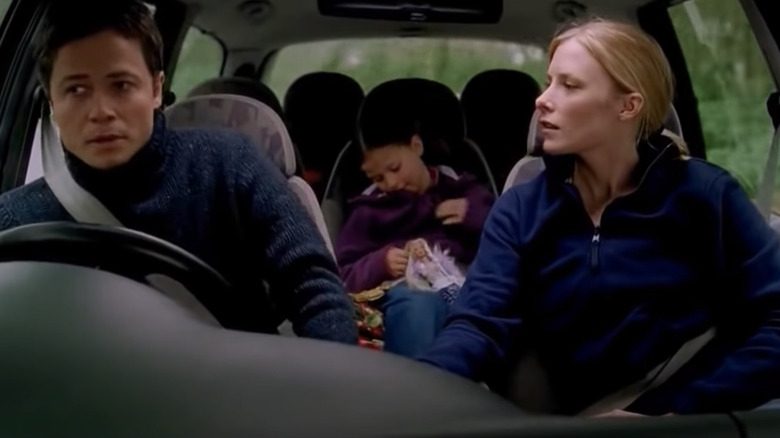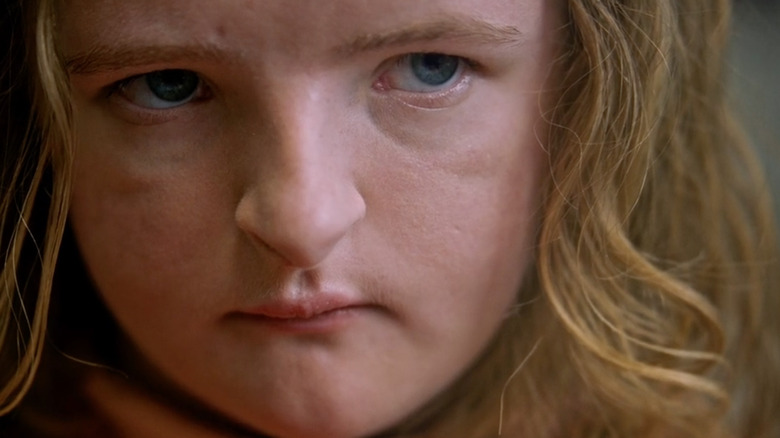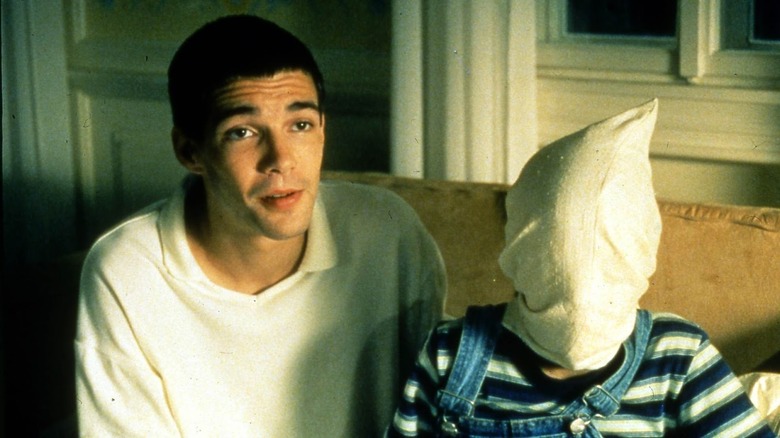Shocking Horror Movie Deaths No One Saw Coming
The ethos of the horror genre has a lot to do with constant elevation. It's always trying to one-up itself, coming up with scares, twists, and kills that will leave audiences more shocked than they've ever been before. It's a tiring effort, but when the genre succeeds at crafting a genuinely groundbreaking moment of pure terror, there's nothing else quite like it.
Death in particular is an enormous aspect of any great horror film, whether it's a looming threat that protagonists must evade, or a spiritual force that aims to wreak havoc on the living. While we might expect a few body counts in any horror film, the characters who die — and the way they meet their demise — can absolutely make or break a scary movie. That's why we're here to celebrate the most surprising and unexpected deaths in horror movies, encompassing classics old and new of the genre. The following deaths might not be the most overtly gruesome (though they often come incredibly close), but they definitely left viewers stupefied as to what they were witnessing on screen. That sense of pure, flabbergasted terror can't shine through in every piece of horror media, but hats off to the ones who've made it to this roundup.
Casey Becker in Scream
This is perhaps the go-to example of a horror death that absolutely no one saw coming, and it's for very good reason. Nineties it-girl Drew Barrymore was practically set up to look like the prospective protagonist of "Scream," only to be killed by Ghostface before the title card pops up. Director Wes Craven executed one of the greatest bait-and-switches in horror history by having Barrymore's character, Casey, ruthlessly stabbed and gutted, signaling that absolutely no one is safe with this masked murderer on the loose.
But let's face it, Craven owes the concept of Casey's death to the preeminent master of suspense, Alfred Hitchcock. Casey's death is pretty much just a modern update of the shower scene in "Psycho," Hitchcock's 1960 classic that had Marion Crane (Janet Leigh) stabbed to death under the running water. While drawing from one of the most famous horror movie scenes ever, Craven's ability to adapt the moment and pull that Hitchcockian punch anew signals his strength as a filmmaker — and cements Casey's death as one of the most shocking of all time, right up there with Marion's.
Thomas Kane in Alien
Another totally unexpected kill comes from Ridley Scott's 1979 "Alien," which deals with the crew members of the Nostromo space vessel who accidentally come into contact with extraterrestrial lifeforms. The consequences of the contact, however, are far more gruesome than anyone could have ever anticipated. After having a facehugger latch itself onto his face, Kane begins to fall mysteriously ill. One night, during a mundane (if somewhat pleasant) dinner, he begins to groan and writhe in unimaginable pain. As his crew lays him out on the table and tries to quell his pain, it soon becomes clear their efforts are futile. A slithering alien with razor-sharp teeth bursts right out of his chest cavity, sending blood and guts flying across the white-walled room. Everyone is frozen in shock, awe, and terror, and the chestburster quickly flees, rapidly growing into a much bigger problem for the crew to face off with shortly.
Because Scott's vision of alien lifeforms was so radical (thanks to the design of artist H.R. Giger), the death came totally out of left field for viewers. I mean, before "Alien," who ever expected the possibility of aliens laying eggs in characters' chests to be a cause of untimely death?
Sarah Carter's daughter and husband in The Descent
As opposed to dying from a bloodthirsty killer or monstrous entity, the shocking deaths in "The Descent" are much more rooted in real-life tragedy. After going on a whitewater rafting adventure with her fellow thrill-seeking friends, Sarah (Shauna Macdonald) packs up her gear and hitches a ride home with her husband and their young daughter. While conversing during the drive, her husband suddenly becomes distracted, swerving into the opposite lane and crashing head-on with a van with copper pipes precariously strapped onto its roof. Upon impact, the pipes burst free, impaling Sarah's husband and child. When she wakes up in the hospital, she hears the terrible news and crumbles with grief. No one expects a sudden tragedy, and the brutality of the split-second accident leaves the viewer as rattled as Sarah.
This is only where the terror begins in "The Descent." One year after her family's horrible passing, Sarah agrees to join her friends on a cave spelunking trip — one that'll leave them fighting for their lives in an unknown underground system that harbors deadly tenants.
Charlie Graham in Hereditary
Seriously, it's hard to top Charlie's demise in "Hereditary" when it comes to examples of totally unexpected deaths in horror films. Ari Aster's feature debut crosses the line that few directors dare: that of violently and graphically killing children. Of course, throwing caution to convention is what often distinguishes a horror film as truly great and innovative. Forced to take his little sister, Charlie (Milly Shapiro), to a high school party, Peter (Alex Wolff) quickly ditches her in favor of smoking weed with his crush. After accidentally consuming chocolate cake containing nut clusters, Charlie begins to go into anaphylactic shock. Panicking and rushing his sister to the emergency room, Peter drives erratically and speeds heavily on their drive. Desperate for air to enter her closing windpipe, Charlie sticks her head out of the car window, coming into contact with a telephone pole at literally breakneck speed. She's decapitated immediately.
Shocked from the ordeal, Peter slowly drives home. He parks the car in the driveway, silently enters the house, and crawls into his bed. He never falls asleep, instead staring off into the distance in a clearly catatonic state. In the early hours of the morning, his mother, Annie (Toni Colette), goes to the car for a quick craft store run. What she finds is her daughter's bloody, headless carcass in the backseat. Instead of showing us what Annie sees, Aster cuts to Charlie's rotting, ant-infested head cooking on the hot pavement, a horrifying sight no one was expecting to see. After this moment, the hellish terror of "Hereditary" only escalates — there's barely even time to breathe.
Georgie Schober in Funny Games
While Ari Aster may have crossed the line of the unstated "no dead kids" rule, Michael Haneke's "Funny Games" remains one of the most unsettling depictions of child death in the horror genre. In his 1997 violent Austrian thriller (which he remade shot-for-shot in English in 2007), Haneke satirizes how media has made us desensitized to violence, with one of the film's killers routinely breaking the fourth wall in order to address viewers directly. He winks, smiles, and asks viewers to bet on whether or not his victims will survive, a move meant to implicate the viewer in the atrocities occurring on screen. We must want to see violence, otherwise why would we be sitting and watching this film in the first place?
A wealthy family on vacation finds themselves taken hostage by two well-dressed young men. They're total strangers, though they feigned a familial relationship with one of the family's neighbors. Over the course of several hours, the two men torture the family at gun point, a dynamic that culminates in the fatal shooting of the family's young son, Georgie. For dramatic effect, he's shot dead right in front of the family's TV, symbolizing the connection between violence and media. With the boy's parents still alive, it's a harrowing kill that is meant to serve an intellectual purpose. However, Haneke's emphasis on viewer culpability throughout the film's bloody spectacle make Georgie's death feel all the more queasy.
